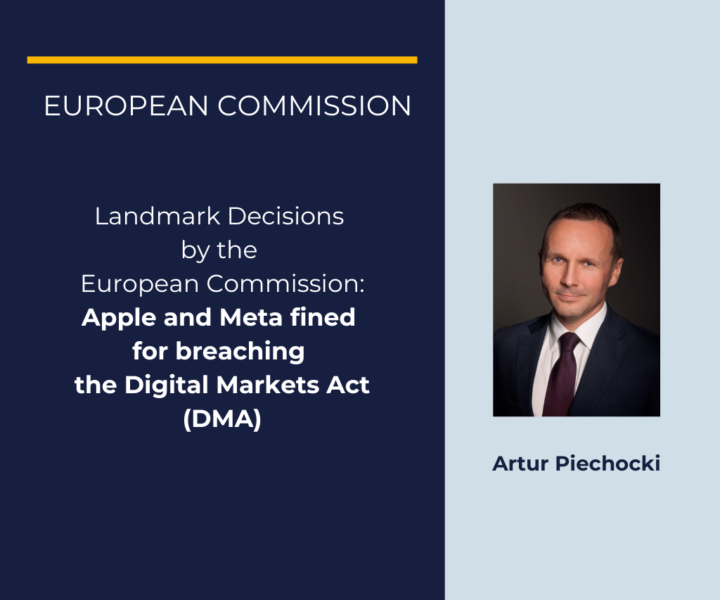Landmark Decisions by the European Commission: Apple and Meta Fined for Breaching the Digital Markets Act (DMA)

APLAW recognized in Media Law International 2025 Ranking for the ninth consecutive year
April 7, 2025
Artur Piechocki re-elected President of the Arbitration Court for Internet Domains at the Polish Chamber of Information Technology and Telecommunications.
June 16, 2025

The European Commission has taken a decisive step in enforcing the Digital Markets Act (DMA) with its first-ever sanctions under the regulation. On April 23, 2025, the Commission imposed fines of €500 million on Apple and €200 million on Meta for serious violations of their obligations under the DMA.
In Apple’s case, the Commission found the company in breach of the DMA’s ban on anti-steering practices. This rule is designed to allow app developers to inform users about alternative offers available outside the App Store. Apple’s technical and commercial restrictions prevented developers from using all available distribution channels, thereby limiting consumer access to potentially more affordable options. The Commission has ordered Apple to lift these restrictions and to implement compliant solutions going forward.
Meta, meanwhile, was found to have violated DMA requirements with its “Consent or Pay” model. Under this approach, users were given a binary choice: either consent to the processing of their personal data for personalized ads or pay a subscription fee to avoid advertising. The Commission determined that this model did not offer a genuinely equivalent, less data-intensive alternative, failing to meet the standard of freely given consent. Although Meta introduced new measures in 2024, the decision addresses the period when only the binary option was available.
These rulings—marking the first findings of non-compliance under the DMA—underscore the European Commission’s commitment to establishing fair competition and consumer rights in the digital marketplace. Both Apple and Meta have 60 days to implement the required changes or face additional penalties.
“These decisions send a clear message: no matter how dominant, companies must respect the rules of fair competition and consumer transparency,” commented attorney-at-law Artur Piechocki. “This may spark broader changes in how the biggest players operate in the digital space and serve as a strong signal to others that the DMA carries real enforcement power.”
We invite you to learn more about our expertise in Artificial Intelligence and Competition & Consumer Protection.